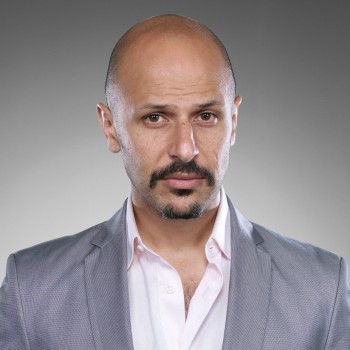Maz Jobrani has built a career as an actor and stand-up comedian, in spite of a Hollywood system that attempted to limit him to roles as a terrorist villain. This weekend, the comedian speaks at an Arts Summit at The Kennedy Center, alongside Spike Lee and Ai Weiwei.
Jobrani has written a memoir about that experience, “I’m Not a Terrorist, but I’ve Played One on TV: Memoirs of a Middle Eastern Funny Man.” He tells an excerpt from the book.

Hi. This is comedian Maz Jobrani. Here’s a story I want to tell you from the book that I think you will like.
Early on in my career, one of my biggest goals was to become a regular comedian at the world famous Comedy Store, one of the biggest comedy clubs in the country, on Sunset Strip. People like Jay Leno, David Letterman, Jim Carrey, Robin Williams, Eddie Murphy — who was my comedy hero — had gone through this club.
 To become a regular at The Comedy Store, you have to audition in front of the owner, who is Mitzi Shore, Pauly Shore’s mother. I am originally from Iran. I’ve grown up in America, so I’m an Iranian-American. So, a lot of my material dealt with being Iranian American. And there weren’t any Middle Eastern comedians at The Comedy Store. So, I think Mitzi had seen me and was taking a liking to me, but you don’t talk to her until the very, very end of this auditioning process.
To become a regular at The Comedy Store, you have to audition in front of the owner, who is Mitzi Shore, Pauly Shore’s mother. I am originally from Iran. I’ve grown up in America, so I’m an Iranian-American. So, a lot of my material dealt with being Iranian American. And there weren’t any Middle Eastern comedians at The Comedy Store. So, I think Mitzi had seen me and was taking a liking to me, but you don’t talk to her until the very, very end of this auditioning process.
The way it works is, you perform on a Sunday night in front of a crowd that’s there to see open mic night. Mitzi sits in the back of the room, watching you — the room is very dark. She’s seated in the last chair right next to the exit. As you walk off the stage, you have to pass Mitzi to get out of the club.
Now if she lets you go, that means you’re not a regular and you leave miserable. But if she grabs your arm, that means that you’re going to become a regular.
So here I am, I finished my last 10 minutes. I felt like I did a good job. I’m walking off stage, I’m about to walk out the exit. I’m thinking, “Oh no, she’s going to let me go,” and then she grabs my arm. She leans into my ear and she goes [imitating Mitzi], “You’re very funny,” because that’s how Mitzi talks.
And I go, “Thank you, Mitzi.”
She goes, “I’m going to make you a regular.”
I go, “Thank you Mitzi.”
But she keeps holding onto me and she goes, “Have you ever thought about wearing the outfit?”
And I go, “What outfit?”
“You know, the outfit, the hat and the gown.”
And I was like, “The hat and the gown? Oh my God, she wants me to wear a turban on stage and a dishdasha!”
Now how am I going to compromise my values? How am I going to compromise my people and sell myself out? I turn to her. I said, “Mitzi, yes, I will definitely wear the outfit.” And I walk out and now I’m a little ambivalent about what just happened, because part of me is excited. I just became a regular, but I also just agreed to wear a turban on stage. That’s going to ruin my career. That’s is going to be the end of my career.
So I called the booker. I knew her. Her name was Cory. And I said, “Listen, Cory, can I talk to you? Listen. What happens if I don’t wear the outfit?”
And she was like, “Do I really have to tell you?” Which basically meant you won’t be getting any spots at the club.
And I go, “Yeah, but Cory, this feels weird to wear the outfit, a turban on stage?”
She goes listen, “Mitzi has had a hand in a lot of people’s careers. She helped Roseanne Barr shop for her outfits and created the character that she created.”
Later on when I was telling people the story, I come to realize, people like Mark Maron, she told him to wear a scarf. She thought he was like the poet comedian. And then there was another guy whose name was Joey Banana. You go, “Joey who?”
And I go, “Exactly.” This was a comedian who during his set used to just put on a banana outfit and he’s never been heard of since.
So, in this process I’m like, “Okay, I got to get out of this turban thing somehow.” And then, light bulb. I remembered that years before there had been an Iranian performer who used to make fun of the mullahs in Iran, and he used to wear a turban. At some event, I heard, some people showed up that supported the mullahs and they threw a rock at him, and they blinded him in one eye.
So I called up Cory. I said, “Cory, I’ve been thinking about this and I’m ready to wear the outfit. I’m ready to go. But if I do, I just want to let you know that somebody might show up and try to take me out. And worse, they may try to take out The Comedy Store.”
Cory was like, “Umm, let me call you back in five minutes.”
So obviously, she hung up and called Mitzi. She called me back five minutes later. She goes, “Eh, you know what, forget the outfit. Just put on something comfortable. You’ll be good to go.”
It wasn’t till years later when I ran into Mitzi again, who was, by the way, very supportive of my career and Mitzi was talking to me one time and I thought she’d forgotten and she goes, “By the way, you’re supposed to wear the outfit.”
The moral of the story is Mitzi Shore never forgets.


